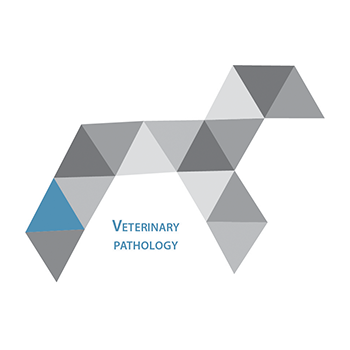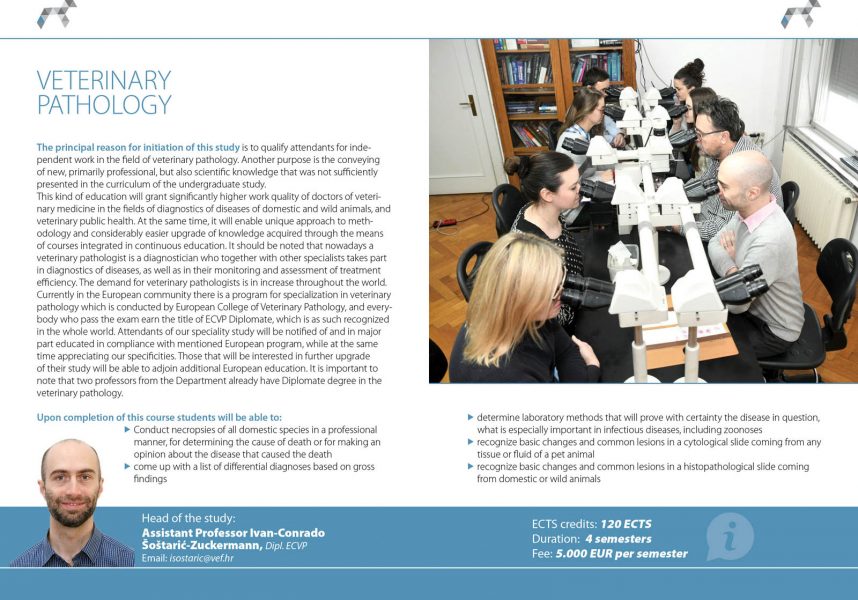The principal reason for initiation of this study is to qualify attendants for independent work in the field of veterinary pathology. Another purpose is the conveying of new, primarily professional, but also scientific knowledge that was not sufficiently presented in the curriculum of the undergraduate study. This kind of education will grant significantly higher work quality of doctors of veterinary medicine in the fields of diagnostics of diseases of domestic and wild animals, and veterinary public health. At the same time it will enable unique approach to methodology and considerably easier upgrade of knowledge acquired through the means of courses integrated in continuous education. It should be noted that nowadays a veterinary pathologist is a diagnostician who together with other specialists takes part in diagnostics of diseases, as well as in their monitoring and assessment of treatment efficiency. The demand for veterinary pathologists is in increase throughout the world.
Currently in the European community there is a program for specialization in veterinary pathology which is conducted by European College of Veterinary Pathology, and everybody who pass the exam earn the title of ECVP Diplomate, which is as such recognized in the whole world. Attendants of our speciality study will be notified of and in major part educated in compliance with mentioned European program, while at the same time appreciating our specificities. Those that will be interested in further upgrade of their study will be able to adjoin additional European education. It is important to note that two professors from the Department already have Diplomate degree in the veterinary pathology.
Upon completion of this course students will be able to:
- Conduct necropsies of all domestic species in a professional manner, for determining the cause of death or for making an opinion about the disease that caused the death
- come up with a list of differential diagnoses based on gross findings
- determine laboratory methods that will prove with certainty the disease in question, what is especially important in infectious diseases, including zoonoses
- recognize basic changes and common lesions in a cytological slide coming from any tissue or fluid of a pet animal
- recognize basic changes and common lesions in a histopathological slide coming from domestic or wild animals
ECTS points: 120 ECTS
Duration: 4 semesters
Fee: 5000 EUR per semester
Head of the study: Assist. prof. Ivan-Conrado Šoštarić-Zuckermann, Dipl. ECVP
Email: isostaric@vef.hr

izv. prof. dr. sc. Ivan-Conrado Šoštarić-Zuckermann, DECVP

- E: isostaric@vef.hr
- T: 01/2390-314
prof. dr. sc. Andrea Gudan Kurilj

- E: agudan@vef.hr
- T: 01/2390-311
prof. dr. sc. Branka Artuković

- E: branka.artukovic@vef.hr
- T: 01/2390-186
prof. dr. sc. Željko Grabarević

- E: zgrabar@vef.hr
- T: 01/2390-313
Obligatory courses |
| Comparative comprehensive pathology |
| Pathology of dogs and cats |
| Farm animal pathology |
| Equine pathology |
| Pathomorphology of diseases to be controlled according to the Veterinary Act |
| Histopathology analysis and basics of cytology |
| Advanced diagnostic techniques in pathology |
| Digital microscopy in veterinary pathology |
| Pathology of dogs and cats |
| Farm animal pathology |
| Equine pathology |
| Pathomorphology of diseases to be controlled according to the Veterinary Act |
| Measures for animal health protection |
| Histopathology analysis and basics of cytology |
| Neoplastic diseases and dermatopathology |
| Pathology of dogs and cats |
| Farm animal pathology |
| Equine pathology |
| Pathomorphology of diseases to be controlled according to the Veterinary Act |
| Veterinary forensics and legal regulations considering animal necropsies |
| Histopathology analysis and basics of cytology |
| Neoplastic diseases and dermatopathology |
| Cytological diagnosis of non-neoplastic diseases |

 Faculty of
Faculty of 